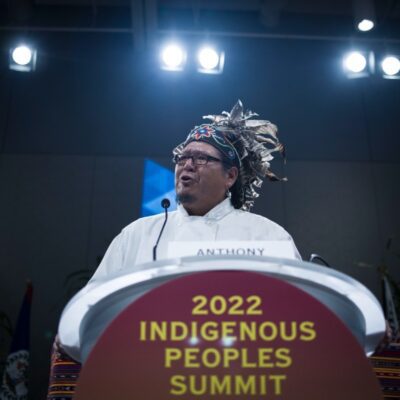Name: Anthony L. Warrior
Location: Nebraska Indian Community College – Santee, NE
Education/background: Bachelor of Business Management/Human Resources
Business name: Warriors’ Palate Catering and Consultation
Tribal affiliation: Absentee Shawnee/Mvskoke-Father; Sicangu Lakota-Mother

What led to your passion for indigenous foods?
I believe it started when I was a young man participating in tribal ceremonies in Oklahoma. I was fascinated watching the grandmothers and mothers that we’re cooking for their families and guests. I think it really blossomed when I became a chef in the native casinos and was asked to prepare traditional native meals. This was difficult at the time as the native ingredients were not readily available or approved to be served in revenue areas. Post-COVID shutdown there has been an increase in interest in finding sustainable food pathways and seeking native knowledge in medicinal practices.
Why do you think it’s important to make traditional foods accessible for Native communities?
I constantly preach to the choir that our traditional foods were once not only used for sustenance but to build a healthy community system through building worth, identity, and healthy foundations. We are also understanding that being connected to our areas for thousands of years has built genetic qualities reflecting from our foods.
What is the importance of an indigenous diet for a healthy lifestyle?
We are currently seeing the detrimental effects of the Western diet on native populations and people worldwide. We are also seeing an increase in depression, violence and early deaths in communities they have relied heavily upon the commodity food systems for sustenance. With the increase in reliance upon Western medicine to treat the effects, we are also seeing a slow poisoning of our populations. This is leading not only to the loss of individuals’ way of life, but also an economical dependence upon the health systems.
What ways are you involved in the education, restoration and accessibility of traditional Native foods?
Within the Nebraska Indian Community College, we are creating a platform to build tribal nation-building through increasing education and knowledge into the communities with the development of curriculum. My part of the development is to build the strong foundation for individuals to reclaim their individuality once again through their tribal contributions to the world and create psychological behavior changes that reverse the effects of colonialization in our learning attitudes. As you can probably guess this has been a difficult process as we are heavily dependent upon the economic system we live in. By enforcing the usage of this current system to develop prosperity amongst our growers and Tribal influences, we can hopefully produce sustainability.
How can community members be involved and support the cause of restoring and protecting indigenous food systems?
Community members in our area must continue to build strength and its leadership, supply education to embrace loss of culture, and dedicate their holistic health into understanding why these changes will continue to heal their families and their futures. I encourage those knowledge keepers to work closely with educational units such as the Nebraska Indian Community College to help document and endorse the practices that we are currently retaining and growing. I would also like the communities to begin to incorporate the traditional foods back into their ceremonies and their daily diets at least 2-3 times a week. This will hopefully encourage our growers to produce more product.
